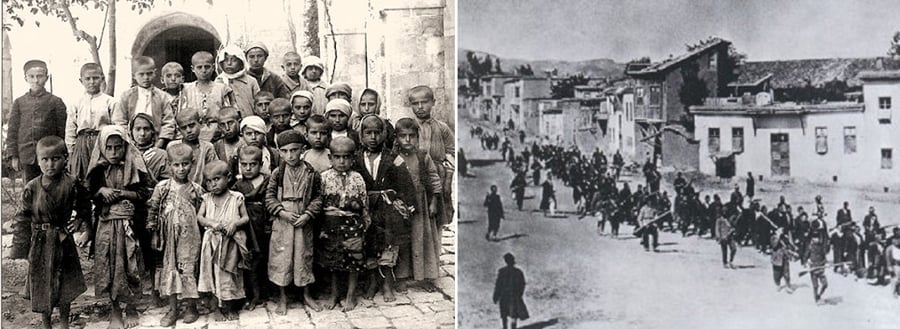By Harut Sassounian
Ever since the Armenian Genocide of 1915, Armenians have fought relentlessly to inform the world about the systematic extermination of 1.5 million Armenians carried out by the Ottoman Empire.
As a result, over 30 countries, several international organizations, and leading genocide scholars have acknowledged the veracity of the Armenian Genocide. After all these acknowledgments, the Armenian Genocide has become a recognized fact — a direct rebuke to Turkey’s denialist propaganda. Regrettably, a few major countries, such as the United Kingdom and Israel, have not yet recognized it, not due to ignorance, but out of political expediency and a desire to appease Turkey. Thus, the era of pursuing recognition must be considered over.
The problem is that after decades of Genocide recognition campaigns, Armenians and non-Armenians, including Turkish officials, have come to the wrong conclusion that recognition is the final objective. This is a fundamental misunderstanding. Our real demands are restitution and the return of Western Armenia. Once Turkey realizes that Genocide denial will not prevent Armenians from pursuing these two other goals, Ankara may finally see the futility of its denialist campaign.
Read also
Nevertheless, the global Genocide recognition campaign was not in vain. The world now knows the truth about the Armenian Genocide. After 110 years, the Turkish government is still confronted with embarrassing reminders of the heinous crimes committed by its predecessor regime.
However, simply acknowledging the Armenian Genocide and issuing an apology would not heal the wounds or undo the consequences. Armenians still await justice, the restoration of their historic rights, and the return of their confiscated lands and properties.
In 1915, the Ottoman Empire carried out a systematic campaign to uproot an entire nation from its ancestral homeland, depriving survivors of their homes, native lands, cultural heritage, places of worship, and personal properties. A gross injustice was perpetrated against the Armenian people, entitling them, as in the case of the Jewish Holocaust, to legitimate compensation for their enormous losses.
Restitution can take many forms. As a crucial first step, the Republic of Turkey must return all 2,500 Armenian churches to Armenian control, placing them under the jurisdiction of the Istanbul-based Armenian Patriarchate. These confiscated churches, converted into mosques, stables, warehouses, or demolished, must be restored to their rightful owners.
Today’s Republic of Turkey — as the successor state of the Ottoman Empire — should be held legally liable for the Genocide and its continuing consequences. Turkey inherited the assets of the Ottoman Empire, and, therefore, it also inherited its liabilities.
Regrettably, presidential proclamations and congressional commemorative resolutions on the Armenian Genocide have no force of law, and therefore, no legal consequence.
Without waiting any longer — since Armenians have waited over a century, they must pursue legal action through international and national courts, including:
— The International Court of Justice (World Court), where only states have such jurisdiction),
— The European Court of Human Rights,
— U.S. Federal Courts, as well as courts in other countries.
The current Government of Armenia has no interest in filing lawsuits against Turkey on the Armenian Genocide in the World Court, so Armenian-Americans must take legal action themselves. Instead of pushing for another symbolic resolution, they must lobby the House and Senate to extend the statute of limitations, enabling Armenians to file lawsuits based on their material losses caused by the Genocide.
Once the House and Senate pass such a bill, it will then go to the President to be signed by him into law. This legislation would follow the legal framework of existing Holocaust-related restitution laws, such as:
— “The Holocaust Victims Redress Act,” enacted by the U.S. Congress in 1998,
— “Holocaust Expropriated Art Recovery Act of 2016,”
— California Assembly Bill 2867 signed by Gov. Gavin Newsom in 2024: “Recovery of artwork and personal property lost due to persecution.”
Once lawsuits are filed in U.S. courts, they will attract global attention, forcing Turkey to confront its criminal past in a legal arena. The Turkish government’s continued denials of the Genocide would then become meaningless.
U.S. courts could issue legally binding judgments requiring Turkey to pay compensation to Armenians for their losses. If Turkey refuses to comply, courts could then order the confiscation of all Turkish government-owned assets in the United States, such as buildings, bank accounts, and planes belonging to Turkish Airlines.
To launch this historic legal battle, Armenians must take two immediate actions:
1) Lobby Congress to pass a law allowing these claims,
2) Hire top legal experts who specialize in international law.
If Armenians win in court, the recognition debate becomes irrelevant. Any resistance or refusal by the Turkish government to comply with such a US court judgment would create a major diplomatic and legal crisis between Ankara and Washington.
This is how Armenians can finally achieve justice — not through more recognition, but through courtroom victories.





















































